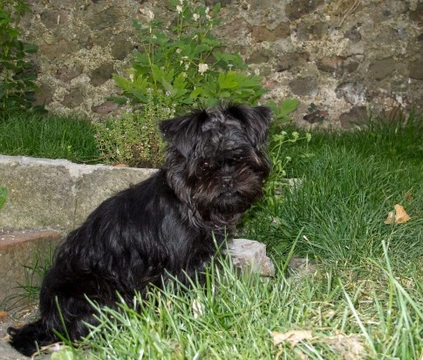
Affenpinscher Dog: Pros, Cons & Care Guide
The Affenpinscher is a small, sturdy toy dog with a distinctive, somewhat comical face and a lively personality. Originating from Germany in the 17th century, this breed was bred primarily to control vermin such as mice and rats. They are notable for their boldness and loyalty despite their compact size. This article explores the breed's characteristics, health, temperament, and the pros and cons of owning an Affenpinscher to help you decide if this energetic little dog suits your family.
Distinctive Appearance of the Affenpinscher
The Affenpinscher typically weighs between 2.9 and 6 kg (approximately 6 to 13 lbs) and stands up to 12 inches tall at the shoulder. Their wiry coat is the breed's hallmark and can be rough and shaggy in full length or fluffy when clipped. Black is the most recognised coat colour in many UK Kennel Clubs, although red, black and tan, grey, silver, and mixed variations also exist.
They have a distinctive "monkey-like" face, which is outstanding and easy to recognise. Affenpinschers belong to the Pinscher-Schnauzer group rather than terriers, though they share some terrier-like personalities, displaying boldness and vivacity.
Health and Longevity Insights
The average lifespan of an Affenpinscher is around 11 to 12 years, which is mid-range for dog breeds of a similar size. Their small frame can make them prone to fragile bones, making fractures a risk, especially with rough handling.
Owners should be aware of common inherited health conditions such as hip dysplasia, patellar luxation (kneecap dislocation), and certain respiratory issues. Routine veterinary care, a balanced diet, and safe exercise are important to ensure their well-being and longevity.
Typical Temperament and Behaviour
Affenpinschers are lively, curious, and confident dogs. They thrive on interaction and excitement, often displaying a protective attitude towards their family. They can be wary of strangers or unfamiliar dogs but usually get along well with other pets when socialised appropriately from a young age.
However, they do have a tendency toward stubbornness and can be territorial about food and toys. They require firm but gentle and consistent training. Despite their energy, they are generally quiet and do not incessantly bark without cause.
Pros of Owning an Affenpinscher
- Small and portable, suitable for homes with limited space and easier to travel with.
- Endearing, distinctive appearance that is truly unique among toy breeds.
- More outgoing and bold personality compared to many other toy dogs, often comparable to terriers.
- Excellent watchdogs with keen alertness to sounds and visitors despite their size.
- Moderate exercise needs—daily walks and playtime suffice without the need for multiple long walks.
- Hypoallergenic coat which is less likely to cause allergic reactions in sensitive individuals.
Cons of Owning an Affenpinscher
- Fragile bones prone to fractures; they require careful handling especially around children.
- Stubborn and independent nature can make training a challenge and requires patience.
- May be wary or suspicious of strangers and unfamiliar animals, needing early and ongoing socialisation.
- House training can take longer due to their strong-willed temperament.
- High demand and limited availability from reputable breeders in the UK can mean waiting times or travel is necessary to find a puppy.
- Require lots of mental stimulation and social interaction; can become bored and potentially destructive if neglected.
Responsible Ownership Tips
If considering an Affenpinscher, seek out reputable Affenpinscher breeders who prioritise health and temperament screening. Early socialisation and consistent training are essential to manage their protective and independent traits. Regular grooming twice weekly will maintain their wiry coat and hypoallergenic qualities.
Providing a balanced diet, safe exercise, and regular vet check-ups will help maintain their health and longevity. Also, supervise interactions with small children and other pets, considering their fragility and natural prey drive towards rodents.
Finding and Buying an Affenpinscher Puppy
Given the breed's rising popularity and relative scarcity, it is important to plan ahead. Using trusted UK sources such as the Kennel Club and reputable online platforms like Pets4Homes ensures ethical acquisition and supports responsible breeding practices.
Always ask breeders detailed questions about health clearances, socialisation efforts, and parental history. Avoid purchasing from puppy farms or unverified sellers to protect welfare and reduce risk of health and behaviour issues.
Conclusion
The Affenpinscher is a bold, lively, and affectionate small dog with a unique look and charming personality. Ideal for owners who can dedicate time to training, socialising, and grooming, they make wonderful companions especially in urban homes. Understanding the breed’s needs and challenges helps ensure a fulfilling and responsible relationship for both owner and dog.



